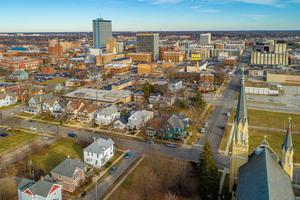Celebrating Christmas Past, Present and Yet to Come
COMMENTARY: Ebenezer Scrooge captured the essence of ‘keeping Christmas all through the year.’

In his last words to the Spirit of Christmas Yet to Come in A Christmas Carol, Ebenezer Scrooge declares his firm purpose of amendment in these words:
“I will honor Christmas in my heart, and try to keep it all the year. I will live in the Past, the Present, and the Future. The Spirits of all Three shall strive within me. I will not shut out the lessons that they teach.” That declaration is very Catholic. Scrooge may have thought of Christmas in terms of his past, present and future, but we Christians also should think of celebrating Christmas Past, Christmas Present and Christmas Future.
Too many people, alas, seem only to focus on Christmas Past.
Christmas Past is not the sentimental memories of youth, whether it be an abandoned schoolroom, Mr. Fezziwig’s apprentice shop, one’s childhood in Wales, a Red Ryder BB Gun, or the aluminum Christmas tree I put up as a kid. Christmas Past is what happened in a Judean stable one night more than 2,000 years ago. That night was when the “arc of history” bent irreversibly, when “the hopes and fears of all the years” — past, present and future — “were met in thee tonight,” when all human history received a new and immutable meaning.
Because of what happened that night in Christmas Past, the present and future have all received their meanings. So we rightly remember, and rightly rejoice, in the memory of that night.
But if our preparation for Christmas is confined to Christmas Past, to remembering an historical event — even one as pregnant with meaning as this — if our preparation is limited to sentiments and memories, it is sorely lacking.
We must not confine ourselves to Christmas Past, but also attend to Christmas Present. Christmas Present is not about the presents, parties, shopping lists, Christmas trees, projections about Christmas morning, guessing who’s coming for Christmas dinner or cooking a goose, ham or turkey. Christmas Present is whether Christ is made present in my life here and now.
It’s not just enough to remember the objective fact that Jesus came: We must pair it with the subjective fact that Jesus comes into my life. He is our best, most important and, ultimately, only present, because all other good we have comes from his hand: “In Him all things were created. All was created through him; all was created for him. He is before all else that is” (Colossians 1:16-17).
So the question of Christmas Present is: “Is he present in my life? Am I doing everything I can to ‘make ready’ his way for Christmas?” Do I intend to live in Christmas Present, in receiving in my flesh now the same Christ who came to Bethlehem then? Or am I content with a dead memory of what happened, while finding no application for it in my life? It’s not enough just to remember. We need also to celebrate — now.
The Ave Maria asks Our Lady’s intercession in two instances. They are the only two moments we are guaranteed and the only two moments that matter: “now and at the hour of our death.” Christmas Present is about Christ now.
That other moment fits into Christmas Yet to Come.
Christmas Yet to Come is not just about how life goes on without me, how people react to my passing, or whether my final resting place is “overrun by grass and weeds.” Life will go on without me, and the increasingly superficial and tenuous ties between people in a society that bowls alone are also likely to lead to sparsely populated funerals (if they haven’t disappeared already). How people react to my passing will be more indifferent to me than whether they pray for me.
Christmas Yet to Come has a twofold meaning.
Individually, am I getting ready to meet the Christ Child who will be my Judge when my world comes to an end?
Am I getting ready to rejoice with that Christ Child in the eternal Christmas and eternal Easter that is heaven?
Communally, the first Christmas set the arc of human history: What happened that night in Judea fixed what would happen on the last day on earth.
The Christ who came as a Child in a manger will return “to judge the living and the dead.”
Focusing on how he came while ignoring how he will come, again, seems wrongheaded. So, am I getting ready this season for Christmas Yet to Come, the one page of salvation history yet to be written?
For we must not just remember or even celebrate. We must believe in what he told us.
In professing his resolution to “live in the Past, the Present and the Future. The spirits of all Three shall strive within me,” Scrooge captured the essence of Christmas, even if he didn’t know it fully.
Christmas is about what was, about fixing what is, and about readying for Who is to come. That’s a message we can “try to keep all the year.”
It’s as close as the nearest Mass.
















